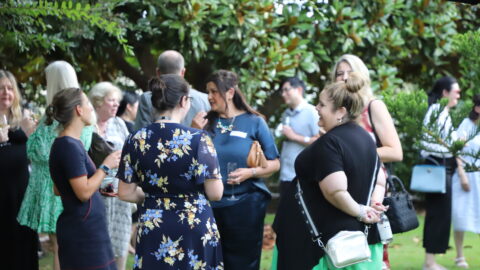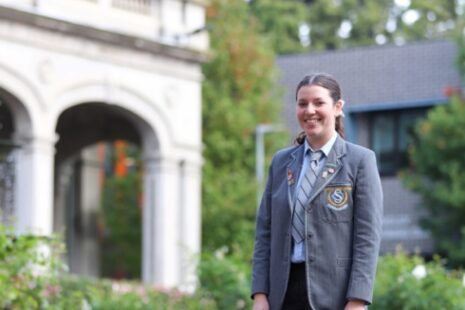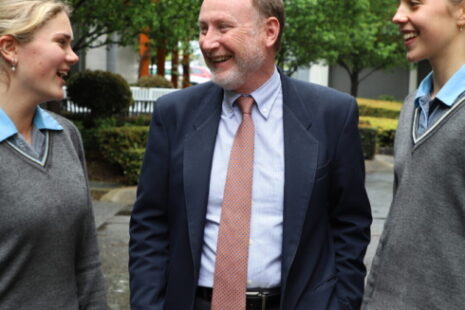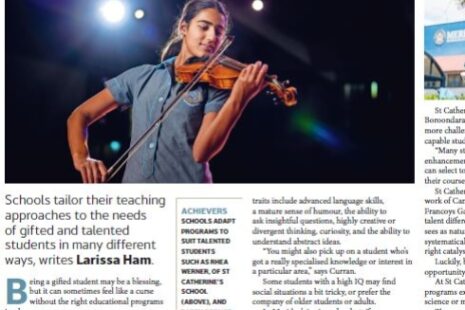Building a Depth of Knowledge

Launching this year, our Senior School will be defined in two key learning sectors:
Middle Years Learning Model (Years 7 to 9) under the leadership of our new staff member, Ms Freda Armstrong, in her role as Director of Middle Years; and
Senior Years Learning Model (Years 10 to 12) signifying the commencement of VCE programs across Years 10 to 12, ably led by Director of Senior Years, Mrs Alison Cassidy.
Together with Deputy Principal – Teaching and Learning, Mrs Ceri Lloyd, the Senior School will continue to embark on our fourth year of embedding St Catherine’s School’s Thinking Agenda into every classroom in the Senior School.
As a key feature of our Towards 2025 Strategic Plan and formalised through our partnership with the University of Queensland, we have reshaped our teaching practice at St Catherine’s to equip our students with a strong capacity in critical and analytical thinking, evidenced through the recent revised editions of the VCE Study Designs.
Critical and analytical thinking is desired well beyond the classroom as it shapes much of the knowledge economy and the changing nature of the workforce. Such examples include identifying biases in data, news and in people’s own interpretations. Through critical and analytical thinking students develop deeper understanding of complex ideas, knowledge and exercising empathy for different perspectives.
The concept of building a greater ‘depth of knowledge’ is most often applied to the ‘thinking that students do’ – during class time, and through their assessments and evaluations. Undoubtedly, the most important thing happening in a classroom, at any given time, is what a student is thinking. Key questions for teachers include:
How do you know students are thinking in your classroom?
How do you plan for student thinking?
How do you give feedback on student thinking?
The development of students’ higher-order intellectual skills or cognitive thinking abilities is the most important educational task of schools today.
By way of example, the Australian Curriculum and the current VCE English Study Design, requires secondary school students to critically analyse the way in which language is used to persuade in a variety of texts. Students from Year 7 examine how persuasive language is used to express an argument to strengthen the intended impact of texts, including newspapers and multimodal texts.
As students progress to Year 12, the development of their critical understanding of contemporary media and the differences between media texts requires them to analyse how written and visual techniques are used to persuade readers. This skill is essential to interpreting the world with a critical and discerning mind. These abilities underpin our students’ perceptions of the world and consequently the decisions they make.
The recent explosion of generative AI, like Chat GPT, has been met with mixed reactions in education. Indeed, AI raises questions about how we assess students, how students learn to write, and what constitutes cheating and plagiarism. In reply, some government education departments across Australia have banned access to Chat GPT in schools.
Our view at St Catherine’s is that AI is another ‘intellectual partner,’ that can be used to inform our teaching and learning. Our students will be educated on this new software to enable them to access it when appropriate for their own studies, to correctly reference work as per other search engines, and strengthen their studies, much like they will use AI in their workplace in future years.
As we analyse the VCE results from the previous two years, I am confident every classroom at St Catherine’s is a ‘thinking classroom.’ A learning space where every student is actively engaged to not just rote learn information but engage in pedagogy driven by the belief that learning is shaped by students who are taught how to question and how to learn. From this they will possess an intellectual quality of thinking that prepares them for a complex and interconnected world, rather than accumulating vast amounts of facts and content.
Valuing innovation, as evidence by our Senior Years Learning Model, our Year 9 Critical Conversations Program, and the new Academic Advisory Program, we will approach AI and Chat GPT as the next phase of innovation and the exciting world of learning our students will engage with at St Catherine’s in the coming year.





